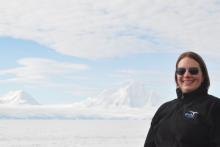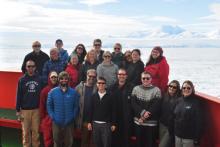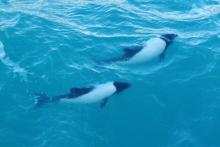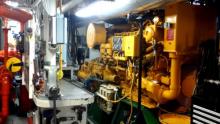Update
Now Archived! PolarConnect event with Cara Pekarcik and Dr. Bethany Jenkins from the R/V N.B. Palmer on Monday, 3 October. You can access this and other events on the PolarConnect Archives site: https://www.polartrec.com/polar-connect/archive
What Are They Doing?

Where Are They?
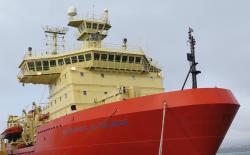
Latest Journals

I am a marine microbial ecologist that uses a combination of laboratory and field measurements to understand how phytoplankton in the ocean function in present and predicted future oceans. Phytoplankton are single-celled algae that live in the surface ocean and take up carbon dioxide and convert it to oxygen via photosynthesis. My research team specifically focuses on diatoms, a group of phytoplankton that build shells out of silicon, generate about 1/4 of the oxygen we breathe and are very important in the Southern Ocean ecosystem.
My love of science started as a grade school student in Elmhurst, IL. I am the product of good public schools for my entire K-12 education. I was a biochemistry major at Mount Holyoke College in MA for my undergraduate degree. Following this, I was a high school science teacher for two years at Pomfret School, an independent boarding School in CT. I went on to earn my PhD in Chemistry from the University of Oregon and conducted postdoctoral research at UC Santa Cruz. I have been in my current position as a faculty member at the University of Rhode Island for 10 years.

Kristen Buck is an Assistant Professor in the College of Marine Science at the University of South Florida. Her primary research interests are focused on the biogeochemical cycling of trace metals and nutrients in the marine environment. In particular, research in the Buck lab examine the predominant chemical forms (or speciation) of trace metals in seawater, implications of this speciation for metal bioavailability, and feedbacks between natural biological communities and seawater chemistry.

Dr. P. Dreux Chappell is a marine microbial ecologist and an assistant professor at Old Dominion University that uses interdisciplinary approaches to study the interplay between phytoplankton dynamics and ocean chemistry. An overarching theme that connects her research is: what forms of nutrients are biologically available to ocean phytoplankton, some of the most important primary producers on the planet? She use a suite of molecular biological tools and analysis of trace metal and macronutrient concentrations in seawater to link biological activity and chemical distributions in controlled laboratory settings and in the field. She uses these tools to answer broad questions about the environmental factors that control phytoplankton distributions and productivity. She has a B.A. in Biology from Amherst College, spent a semester of college in Woods Hole studying environmental science at the Marine Biological Laboratory while attending Amherst, and has a Ph.D. from the Massachusetts Institute of Technology-Woods Hole Oceanographic Institution Joint Program in Chemical Oceanography.

